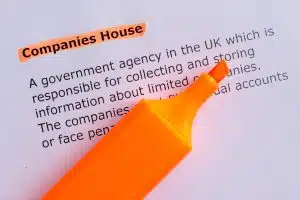 Claims made by Companies House can evoke a sense of fear and seriousness among individuals and businesses alike.
Claims made by Companies House can evoke a sense of fear and seriousness among individuals and businesses alike.
These claims can potentially lead to substantial consequences, including financial penalties and the severe repercussion of director disqualification.
Navigating through such situations requires a thorough understanding of company regulations and legal processes.
It’s crucial to approach these matters with the utmost attention and expertise to ensure the best possible outcome
Companies House Claims
Companies House serves as a central repository where an extensive array of corporate data is stored and shared with the general public.
Within its database, you can find details about:
- The foundational documents of a company;
- The appointed directors;
- The primary stakeholders;
- The company’s fiscal results;
- Recorded assets;
- Outstanding secured debts; and
- Disqualified Directors list
- Announcements related to bankruptcy or termination.
It’s essential to note that Companies House operates mainly on a self-reporting system. As such, the responsibility largely falls on the companies themselves to provide accurate data. Often, this data is neither audited nor cross-checked for its authenticity.
Statutory duty to file documents at Companies House
Owing to statutory obligations, companies are mandated to submit specific documents to Companies House.
These include:
- An obligation to submit an annual confirmation statement, previously known as an annual return until its name change in 2015. It’s essential that this is presented within 14 days post the conclusion of each financial year.
- A duty to lodge financial statements, the format of which depends on the company’s size and classification. These need to be submitted within 9 months after the financial year concludes. However, for companies presenting their inaugural accounts, the submission deadline is extended to 21 months.
This procedure is strictly monitored and serves as a counterpart to the limited liability shield, which permits the formation of companies and facilitates entrepreneurs in bringing their business visions to life.
Sanctions for failing to comply with statutory duties
Should a company not meet its stipulated responsibilities, the Registrar of Companies holds the authority to:
- Dissolve the company;
- Impose a penalty on the company;
- Issue fines to the company’s directors;
- For directors previously fined on two separate occasions, enact a disqualification on those directors.
Notice from the Registrar of Companies’ solicitor
Upon the conclusion of the specified periods, companies should anticipate receiving communication from the legal representative of the Registrar of Companies. Notably, in 2020, the Corporate Insolvency and Governance Act 2020 made adjustments to some of these timelines.
- Companies might first be informed of a looming fine or potential dissolution, followed by a separate notice directed to the directors individually.
- Historically speaking, not every available measure is taken all at once.
- Should no subsequent measures be initiated, imposition of the fine or dissolution becomes inevitable. It’s worth noting that such a fine qualifies as a criminal sanction.
- The company and its directors have the option to engage in discussions with the legal representative of the Registrar of Companies. The objective is often to negotiate a potential halt to the prosecution or dissolution due to extenuating circumstances. However, citing business challenges as a reason is seldom effective. Given that most companies face business challenges, accepting this as a reason could establish an undesirable standard.
Disqualification as a director
The issue of director disqualification is gravely serious. Should a company perpetrate the aforementioned violations (or consistently contravene company regulations) on three instances (inclusive of the present one and any recurrence of a past misdeed), then the Registrar of Companies is obligated to safeguard public interests.
They might subsequently appeal to the court to contemplate the disqualification of the involved director(s) as per the Company Directors Disqualification Act 1986.
- Being barred as a director can significantly affect one’s professional trajectory. In contrast, while criminal fines are noteworthy, their magnitude often pales in comparison to a flourishing business’s overall worth.
- A decree enforcing a director’s disqualification implies that said director(s) cannot partake in initiating, establishing, or administering (or function as a director for) any limited company within the UK, unless they acquire the court’s endorsement. We have a branch in Cardiff, positioning us to be present at sentencing proceedings in Cardiff Magistrates Court. Our objective often revolves around convincing the judiciary to refrain from disqualifying a director who might be acknowledging the aforementioned criminal fine.
The duration for which a director may face disqualification can span anywhere up to 5 years, be it summarily or upon indictment. Typically, the issued directive will specify the onset of the disqualification phase (usually slated for a future date, granting the director time to organise their responsibilities).
Seeking court permission to remain / act as a director
In instances where one or more directors face disqualification based on the mentioned criteria, there exists a formal procedure that allows the affected director(s) to appeal to a commercial court. This appeal seeks approval for them to serve (notwithstanding the disqualification) in one or multiple pre-defined companies.
To understand this process better, you can refer to our comprehensive webpage dedicated to the procedure for obtaining permission to act as a director. Impressively, we’ve maintained an unblemished success rate for such cases dating back to 2000.
Whether a director has been disqualified due to a company’s financial downfall or because of neglect in submitting the requisite company returns as outlined earlier, the same permission-seeking protocol can be employed.
Conclusion
In conclusion, facing the prospect of fines, claims, or a hearing at the magistrate’s court by the Registrar of Companies can be an overwhelming and daunting experience.
It’s crucial not to navigate these challenges alone. Instead, ensure you are armed with the best guidance and advice tailored to your situation. If you find yourself in such a predicament, don’t hesitate.
Reach out to us immediately using the online enquiry form on our website. Let our expertise guide you through this challenging time, safeguarding your interests and future.
David is a Solicitor and Chartered Tax Advisor. David has many years experience of advising clients on Regulatory Fraud matters, involving the smallest to the very biggest cases.
He regularly lectures to the City of London Police on these and related issues. He regularly advises on Confiscation and other consequences that flow from money laundering offences
